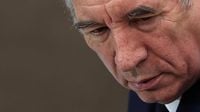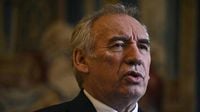In a shocking revelation that has sent ripples through French society, Hélène Perlant, the daughter of Prime Minister François Bayrou, has opened up about the physical violence she endured during a summer camp organized by the same congregation linked to the notorious Notre-Dame de Bétharram institution. Speaking in an exclusive interview with Paris Match on April 22, 2025, Perlant recounted her traumatic experiences that she kept silent for over 30 years.
Perlant, now 53, detailed a harrowing incident from her teenage years when she was just 14 years old. "One evening, while we were unpacking our sleeping bags, Father Lartiguet suddenly grabbed me by the hair, dragged me across the ground for several meters, and beat me with punches and kicks all over my body, especially in the stomach," she said. The priest, who weighed approximately 120 kilos, left her with severe bruises and tinnitus. "To put it bluntly, I urinated on myself and remained wet and prostrate in my sleeping bag all night," she added, vividly recalling the trauma.
This revelation comes just days before the release of her book, Le Silence de Bétharram, co-authored with Alain Esquerre, the spokesperson for a collective of victims from the institution, which is set to be published on April 24, 2025. In this book, she aims to shed light on the systemic abuse and the culture of silence that pervaded the institution for decades.
In her interview, Perlant expressed her long-held belief that her father was unaware of the violence occurring within the institution, despite accusations that he may have covered up the events. "I may have wanted to protect him, unconsciously, from the political blows he faced locally. And he faced many! Violence has always been present, even during his early mandates," she explained, emphasizing the complexity of their relationship.
Perlant’s testimony is particularly significant as it highlights the broader issue of abuse within religious institutions, which has been a troubling topic in France. She described the environment at Bétharram as akin to a cult or totalitarian regime, exerting psychological pressure on both students and teachers to remain silent. "Bétharram was organized like a sect, and the pressure to stay quiet was immense," she stated.
Despite the trauma she suffered, Perlant remained silent for decades, a silence that she attributes to the shame and denial that surrounded her experience and those of many other victims. She remarked, "The victims of physical and sexual abuse did not speak out; each one lived their drama as if they were the only one suffering." This silence, she argues, was a byproduct of a system designed to protect its abusers and maintain its power.
As the scandal continues to unfold, François Bayrou is facing growing scrutiny. He has been accused of failing to act on allegations of abuse that surfaced during his tenure as Minister of Education in the 1990s. In April 1996, a complaint was filed against a supervisor at Bétharram for physically abusing a child, and in May 1998, a former director of the institution was indicted for rape. Despite these incidents, Bayrou has consistently denied any knowledge of the abuses.
Perlant’s recent statements challenge this narrative. She recounted a conversation with her father after he was contacted by the media regarding her upcoming testimony. "He called me and asked, 'Is it true? Are you going to denounce me?'" she recalled. "I told him, 'You’ll see!' He had no idea that I was a victim and that I would testify as such." This conversation underscores the complex dynamics between them, as she seeks to navigate her role as both a victim and the daughter of a prominent political figure.
As the parliamentary commission of inquiry into the scandal prepares to hear from François Bayrou on May 14, 2025, the implications of Perlant’s revelations are profound. They not only call into question the actions of a high-ranking official but also highlight the systemic failures that allowed such abuses to occur and persist.
Perlant's testimony and her upcoming book are poised to ignite discussions around accountability, healing, and the urgent need for change within institutions that have historically silenced victims. She stated, "I need to participate in lifting the veil on the actions committed within this establishment for decades." Her courage in speaking out adds a vital voice to the ongoing conversation about abuse and accountability in France.
As the public awaits the commission's findings and the release of her book, the focus remains on how society can address these painful truths and ensure that such atrocities are never repeated. The story of Hélène Perlant is not just a personal narrative; it is a call to action for all who believe in justice and the protection of the vulnerable.










